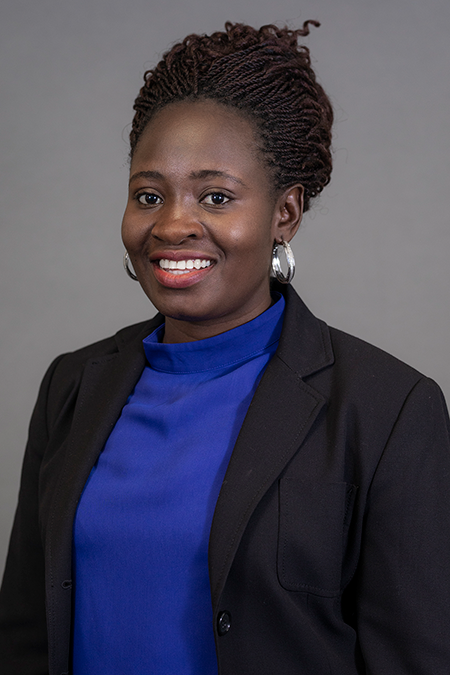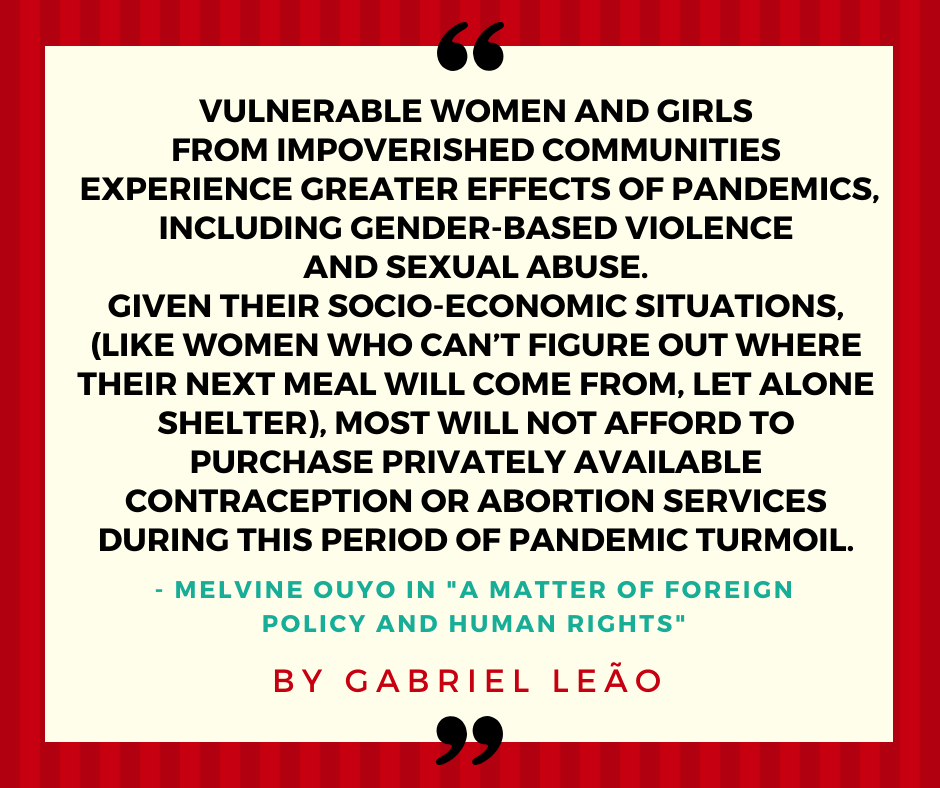 An interview with reproductive rights specialist nurse Melvine Ouyo
An interview with reproductive rights specialist nurse Melvine Ouyo
Although one of the leading countries in the central and eastern regions of the African continent when economically, severe poverty holds back 7.97 million of Kenya’s populace living below the poverty line, a scenario sprung mostly from lack of governmental accountability and social inequality surrounded by failing health and sanitarian systems.
Kenya’s 2019 GDP, according to the International Monetary Fund (IMF), was $ 99.246 billion. Its birth rate in 2017 was 3.6 births per woman according to World Bank. On the other hand, the United States had a GDP of $21.44 trillion and a birth rate of 1.8 in 2017.
It isn’t only that America’s economy is superior to Kenya’s and its birth rate lower: it also has a political fist around birth control and abortion access and measures internationally through its foreign policy program: The Global Gag Rule ( GGG ), which, as IPPF explains well, “denies US funding to organisations if they use non-US funds to provide abortion services, counselling or referrals in accordance with national law. It blocks critical funding for services like contraception , maternal health, and HIV prevention and treatment.”
The Global Gag Rule came into the picture in 1984 during the conservative government under then-President Ronald Reagan. United States President Donald Trump reinstated the Global Gag Rule when he was elected in 2016.
Harvard’s Kennedy School graduate, reproductive health nurse, and former Kibera clinic director for Family Health Options, Melvine Ouyo from Kenya recently visited the American Congress to advocate against the Global Gag Rule and gave an email interview with us at Scarleteen to talk about how this foreign policy health measure affects Kenyan families and controls and overrules women, girls and others with a uterine system.
Scarleteen (ST): You're a former director of the Kibera clinic for Family Health Options in Kenya. Can you tell us about the general status of birth control, family planning and sexual education in your country for most of its citizens?
Melvine Ouyo (MO): In Kenya, before 2009, the unmet need for family planning among women of childbearing age had remained regrettably high at 28%, despite Kenya being the first African country to establish a population policy and a national family planning program in 1967.
Between 2009-2014, access to family planning increased substantially decreasing the unmet need to 18%. With the current Global Gag Rule, the unmet need is projected to go up again. The last Kenya demographic health survey, conducted from 2009-2014, found a maternal mortality rate of 362 deaths per 100,000 live births.
Even though Kenya established sexuality education, its comprehensive implementation has faced resistance from religious leaders, the anti-choice opposition and a lack of political will.
ST: How do you see intersections between birth control, family planning and sexual education?
MO: Birth control, family planning and sexuality education cannot be separated or treated in isolation. Timely sexuality education is paramount as young people transition to adulthood and parenthood.
A lack of early sexuality education results in [unwanted] teen pregnancies and births. Yet, studies have shown that early childbearing leads to uncontrolled births, in addition to many other birth complications.
ST: Can you explain what the Global Gag Rule is and does from your perspective?
MO: Global Gag Rule is the USA policy (formerly the Mexico City Policy) requiring non-governmental organization abroad to endorse that they will not perform, advice/counsel or refer patients/clients for abortion services as a method of family planning, a condition for receiving Global Fund for health assistance. Mike Pompeo’s 2018 expansion applied to all global health assistance.
The policy has devastating impacts among poor and low-income communities affecting organizations, providers, consumers/beneficiaries and communities at large.
- The policy has harmed the lives of women and girls making it difficult to access most needed and critical healthcare services. [That has increased] the number of unsafe abortions, loss of lives and long-term morbidities.
- The policy has led to decreased funding for NGOs, fragmenting the health care systems, leading to termination of programs, closure of clinics, staff layoffs and reduced renumeration for providers. This has resulted in limited access to FP (family planning), change of methods, and undesirable effects among users.
- The policy has created a chilling effect with disrupted coalitions and collaborations among the civil society groups, creating stigma, silencing voices (not using the word “abortion”) and creating distrust among CSOs (Civil Society Organizations), leading organizations to working in silos. Organizations are not making [needed] referrals which are not allowed under the rule.
- There are lots of misunderstandings and misinterpretation of the policy even among policy makers. For instance, asked whether he was aware of the GGR, one government official responded, “I don’t understand what that is.”
- The policy has led to increased negative messaging about SRHR (sexual and reproductive health and rights) by the opposition.
- SRH referral networks disruptions; compliant NGOs are not referring to facilities that provide comprehensive SRH services.
- Partnership disruption: [It has split] spaces for SRHR coordination into compliant and non-compliant forums, abruptly ended major family planning programs, and local organizations [have been] forced to choose between USAID and other donors.
- Limited government response, support and guidance especially because of government over reliance on USA government funding.
ST: The Global Gag Rule impacts most underdeveloped countries. Do you believe this is based in bias?
MO: I believe it is a biased policy in as much as governments and individuals are struggling with solving global challenges, health being one of them. More so, “Health for All” is a universal right which dictates access to health care for all. Instead the policy is imposed on poor and vulnerable communities who are struggling.
 ST: Last year you met with members of the American Congress to advocate for the Global HER Act. What is the Global HER act? How did that meeting go? Did you see any repercussions or results from that meeting?
ST: Last year you met with members of the American Congress to advocate for the Global HER Act. What is the Global HER act? How did that meeting go? Did you see any repercussions or results from that meeting?
MO: Global HER (Health Empowerment and Rights) Act, is an Act of parliament that, if enacted into law by American legislatures, will permanently repeal the Global Gag Rule, such that no American president can ever reinstate the policy again.
I have had several meetings with American congress and senate since 2017 and I must admit that my meetings have yielded results. We’ve seen the number of congress and senate supporting the Global HER Act increase to more than 179 and 48 co-sponsors respectively since the launch of the campaign #Fight4HER.
ST: Does COVID-19 affect the Global Gag Rule in any capacity? If so, how it happens as a whole and also in the specific cases of community health services that may come under more strenuous pressure?
MO: COVID-19 exacerbates all the existing GGR impacts. Like any disease outbreak, COVID-19 pandemic’s pressure will disrupt the healthcare system with strained healthcare professionals deprioritizing maternal health including family planning and abortion services. This limits access to needed SRH services by already GGR hit communities.
Prolonged quarantine and limited access will obviously result in unplanned pregnancies, unsafe abortions and a likely increase in maternal deaths from unsafe procedures. COVID-19 worsens the situation given the current disintegrated collaborations among organizations caused by the chilling effect of the Global Gag Rule, yet we’re at that moment when we most need to join hands in tackling the pandemic. Worse still, certain providers who were forced to disintegrate services due to GGR lack the capacity and resources to respond to the COVID-19 emergency. In addition to lack of access to services, the pandemic also disrupts the supply chain for contraception.
How does a lack of abortions impact impoverished family groups already dealing with the Coronavirus in their communities?
Vulnerable women and girls [and other pregnant people] from impoverished communities experience greater effects of pandemics, including gender -based violence and sexual abuse . Given their socio-economic situations, (like women who can’t figure out where their next meal will come from, let alone shelter), most will not afford to purchase privately available contraception or abortion services during this period of pandemic turmoil.
